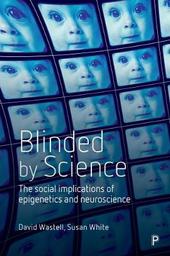
|
Blinded by Science: The Social Implications of Epigenetics and Neuroscience
Paperback / softback
Main Details
| Title |
Blinded by Science: The Social Implications of Epigenetics and Neuroscience
|
| Authors and Contributors |
By (author) David Wastell
|
|
By (author) Susan White
|
| Physical Properties |
| Format:Paperback / softback | | Pages:304 | | Dimensions(mm): Height 234,Width 156 |
|
| Category/Genre | Genetics (non-medical)
Neurosciences |
|---|
| ISBN/Barcode |
9781447322344
|
| Classifications | Dewey:361.61 |
|---|
| Audience | | Professional & Vocational | |
|---|
| Illustrations |
8 Halftones, black and white; 8 Tables, black and white
|
|
Publishing Details |
| Publisher |
Bristol University Press
|
| Imprint |
Policy Press
|
| Publication Date |
15 March 2017 |
| Publication Country |
United Kingdom
|
Description
This timely book critically examines the capabilities and limitations of the new areas of biology that are used as powerful arguments for developing social policy in a particular direction, exploring their implications for policy and practice. It will enable social scientists, policy makers, practitioners and interested general readers to understand how the new biologies of epigenetics and neuroscience have increasingly influenced the fields of family policy, mental health, child development and criminal justice
Author Biography
David Wastell began his career as a cognitive neuroscientist at Durham University before moving to the Medical School at Manchester, where his interests in technology led him to specialize in Information Systems. He is now Emeritus Professor of Information Systems at Nottingham University. Sue White is Professor of Social Work at the University of Sheffield. She is a registered social worker with an academic background in sociology and has spent the last two decades researching how professionals use knowledge in their everyday reasoning.
Reviews"this book provides a wealth of information and helpful analysis...I would strongly recommend that readers buy this book and share with colleagues." Aotearoa New Zealand Social Work "The information and challenges this book presents should be viewed as a timely warning to those who wish to rush to judgement about findings from science that few have examined as carefully and critically as these authors. We are in debt to them." Children Australia "Part of the appeal of the book is the unique constellation of expertise and interests that the authors bring to their topic-it is not often you get a neuroscientist and a sociologist working together on a detailed synthesis of their respective fields." The British Journal of Social Work "Well-written, highly informative and amply referenced, this is an important book to read and return to, for teachers, students and practitioners." Professional Social Work Magazine. "Too often early childhood policy is founded on dogmatic interpretations of over-simplified science. Skepticism is the antidote, which this remarkable piece of scholarship provides, bringing ethical concerns to the fore." John Bruer, President Emeritus, James S. McDonnell Foundation "Forensically detailed, compelling and at points unsettling, this book is a very welcome antidote to simplistic policy appropriations of biology. It deserves to be widely read." Val Gillies, Professor of Social Policy and Criminology, University of Westminster
|